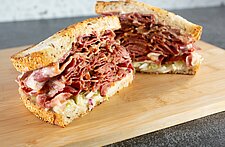While the exact dates are up for debate, Generation Z describes any person born roughly between the late 1990s and the early 2010s. As this generation comes into young adulthood, they present distinct preferences and behaviors when it comes to how they consume food and beverages.
Gen Z dining habits are often characterized by digital nativism, a rich understanding of diverse cultural influences, and a strong penchant for authenticity. As more members of Gen Z enter the consumer pool, the landscape of the food and beverage industry is starting to shift. Understanding how they are affecting this landscape is key to marketing to them effectively.
 Understanding Gen Z's Consumer Trends
Understanding Gen Z's Consumer Trends
Gen Z's food and beverage choices tend to be driven by a desire for authentic and memorable experiences that are environmentally sustainable. They value emotional connections and actively seek out products that evoke personal nostalgia. Let's explore some of the major trends that exemplify this generation's shopping characteristics:
1. Flavor Preferences That Reflect Emotional Discovery
Gen Z food preferences tend to evoke positive emotions and nostalgic memories. This has also led to the rise in popularity of chef-centric cuisines and restaurants. This trend is exemplified by food, beverages, or experiences that communicate the creator's sense of nostalgia even if their consumers do not share the same experiences.
Gen Z flavor trends lean towards classic tastes that evoke warmth, comfort, and indulgence. Different demographics will associate different ingredients with these feelings. Brands can adjust their flavor profiles to target specific cultural groups within the general Gen Z population.
2. Innovation Driven by Nostalgia
Nostalgia plays a significant role in Gen Z snack choices, driving demand for products that harken back to their childhood favorites or reflect their cultural heritage. Brands have had success with retro packaging designs as well as revamped versions of classic snacks. Brands are leveraging this drive toward nostalgia to captivate Gen Z taste buds.
3. Experience-Centric Consumption
Gen Z food preferences are also firmly rooted in pleasure and enjoyment. They seek out products that offer sensory satisfaction or a physically gratifying experience. They want the food or beverages they purchase to provide an experience beyond taste. This can be seen in how restaurants and brands consider the importance of social media apps like TikTok when it comes to driving Gen Z business. Providing an easy way for patrons to share their experiences on social media is a popular tool for marketing toward Gen Z foodie culture.
4. Sustainability and Ethical Consumption
Gen Z food trends are also deeply connected to social concerns around sustainability, ethical sourcing, and labor practices. They expect brands to demonstrate a commitment to environmental stewardship and social responsibility, which strongly influences their purchasing decisions. Their online savvy has made them socially aware, and they find it easy to research and confirm these ethical practices. Gen Z's food preferences prioritize trusted businesses with values that mirror their own.
Related: Gen Z Drives Sustainability in the Food Industry
5. Preference and Loyalty for Trustworthy Brands
Generation Z consumers need more than just the promise of sustainability. They are keenly aware of the world around them, and having grown up with the internet, they are experts in doing research online. This means they are quick to sniff out how trustworthy a brand is and reward honesty with their loyalty as consumers.
Gen Z consumers are much more likely to buy from companies they trust. They consider factors such as honesty, integrity, and historical reliability in their purchasing decisions. Brands that demonstrate authenticity and can establish and nurture trust with Gen Z consumers will be rewarded with long-lasting relationships driven by brand loyalty.
 All About Gen Z's Shopping Habits
All About Gen Z's Shopping Habits
A blend of convenience and desire for new experiences epitomizes Gen Z's shopping habits. They value their time and seek products and experiences that are respectful of their time. Gen Z also grew up on the internet, where they became accustomed to seamless e-commerce experiences. They came of age surrounded by advertising algorithms that provided personalized recommendations based on their preferences and recent purchases.
This digital-savvy leaves them with a desire for novel and tactile experiences. This is especially the case when it comes to eating out and shopping in brick-and-mortar retail spaces. They seek out excellence and novelty at specialty food shops and farmers' markets. They also look for experiential retail environments that carry unique products, offer immersive new experiences, or provide photo ops where they can make new memories and share them on social media.
If your brand seamlessly integrates online and offline channels to provide one cohesive shopping experience, it will be well-positioned to capture Gen Z consumers. Using technology to augment the in-store experience and offer personalized recommendations, brands can create memorable shopping journeys that resonate with the Gen Z consumer.
Stay Informed, Stay Inspired - Subscribe to our Newsletter Here!
In the Embrace of Health and Wellness
While indulgence is a common priority, Gen Z consumers increasingly prioritize health and wellness in their food and beverage choices. This means they seek out products that are as nutritious as they are delicious. They tend to purchase products with natural ingredients, functional benefits, and transparency in labeling.
Gen Z's eating habits tend toward the health-conscious more than those of previous generations. This means they do things like reduce their sugar intake, prioritize a plant-based diet with plenty of fruits and veggies, and opt for organic and sustainable options on the checkout line.
Brands that can appeal to Gen Z's health-forward purchasing patterns will have a competitive edge as Gen Z becomes a larger portion of the consumer population. Highlighting the nutritional benefits on your packaging, utilizing healthier ingredients, and sourcing sustainably are great ways to capture the Gen Z consumer share.
 Beverage Preferences of Generation Z
Beverage Preferences of Generation Z
More and more members of Gen Z are reaching the legal drinking age, and their consumption patterns have started to redefine the beverage space. Much like the trend seen in previous generations, Gen Z is drinking less alcohol. Gen Z beverage trends prioritize nonalcoholic alternatives such as craft sodas, specialty teas, and innovatively flavored mocktails. This shift is driven by the generation's desire for a healthier lifestyle combined with the pursuit of new and exciting flavors and experiences. Some of the reasons members of Gen Z cite for why they drink less include general health concerns, designated driver responsibilities, and an overall desire to avoid hangovers.
How to Market to Generation Z: Strategies for Success
Now that we've outlined some of Gen Z's spending and consuming habits, let's provide some tools and ideas to capitalize on this understanding.
-
Authenticity: Clear and concise branding has always been important to get your message across. Expect Gen Z consumers to hold you to your word and do their research on your products.
-
Personalization: A great way to hold the interest of Gen Z is to personalize their experience. Utilizing digital marketing to get the perfect product or experience in their hands is a great way to earn their loyalty.
-
Storytelling: A compelling story has always been a surefire way to keep an audience engaged as well as help create loyal new customers.
Keep Track of Gen Z Food Preferences
Gen Z taste preferences will continue to evolve as they become an ever larger portion of the consumer population. Staying informed about the top food preferences of Gen Z helps you market to this powerful buying sector effectively.
To learn more about our Gen Z initiative and stay up-to-date, get in touch with us here.






